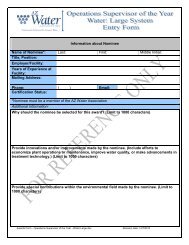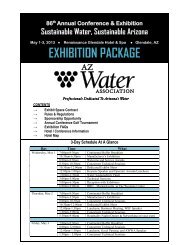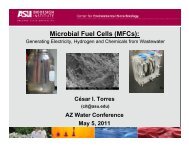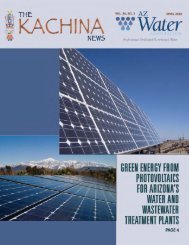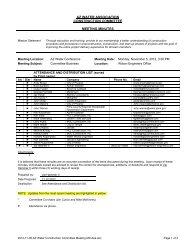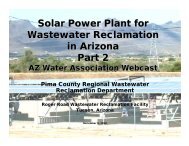Request For Sale (Rfs 08-07) - AZ Water Association
Request For Sale (Rfs 08-07) - AZ Water Association
Request For Sale (Rfs 08-07) - AZ Water Association
Create successful ePaper yourself
Turn your PDF publications into a flip-book with our unique Google optimized e-Paper software.
Fuel Cells Offer the<br />
Ultimate Green Energy Source<br />
By Tom Mossinger, Associate,<br />
Carollo Engineers<br />
<strong>AZ</strong> WATER ASSOCIATION 4 January 2009<br />
for Wastewater Treatment<br />
Digester gas-fueled fuel cells are gaining a foothold in the U.S. municipal wastewater market as concerns<br />
about rising energy costs, greenhouse gas emissions, and the ability to meet clean air requirements grow.<br />
Fuel cells are rapidly replacing reciprocating engines and gas turbines as the most environmentally-friendly<br />
distributed power source for wastewater treatment.<br />
Technology at Work<br />
A fuel cell is an electrochemical device that combines hydrogen fuel and oxygen from the air<br />
to produce electricity, and usable heat and water. Fuel cells operate similar to batteries,<br />
except that, unlike batteries, fuel cells do not require recharging and will produce electricity<br />
as long as fuel is supplied.<br />
By converting the fuel to energy using an electrochemical process,<br />
fuel cells provide a cleaner, quieter, more efficient, and more reliable<br />
cogeneration solution than traditional combustion technologies.<br />
Fuel cell plants operate on biofuels - gases from food processing,<br />
landfills, and wastewater treatment - in addition to natural gas,<br />
ethanol, diesel, and coal gas. The fuel flexibility offered by fuel cells<br />
can be an important benefit for facility owners and operators.<br />
One of the key reasons for the recent increase in fuel cell<br />
installations is the maturing of fuel cell technology and the<br />
associated fuel treatment systems. The new generation of fuel cells is<br />
extremely reliable, only needing to be taken out of service every 18<br />
months for maintenance/parts replacement. The availability of fuel<br />
cell power plants is now being demonstrated at 98 percent, making<br />
them an attractive alternative to competing technologies. In<br />
addition, life-cycle costs are competitive with other cogeneration<br />
technologies. This is due in large part to decreasing installation costs, dropping from<br />
$20,000/kW in 2000 to approximately $4,500/kW today.<br />
SUMMARY OF FUEL CELL ECONOMICS*<br />
No Cogeneration 750-kW Engine 460-kW Microturbine 900-kW Fuel Cell<br />
Total Annual Value of Digester Gas $0 $332,000 $302,000 $653,000<br />
Carbon Footprint Reduction 0% 20% 13% 35%<br />
NOx Emissions, lbs/yr 1,211 6,513 1,811 436<br />
CO Emissions, lbs/yr 3,913 15,519 1,989 1,652<br />
Reduction in Energy Costs 0% 8% 5% 19%<br />
*Data supplied by Eastern Municipal <strong>Water</strong> District, Perris, California, Moreno Valley <strong>Water</strong> Reclamation Plant Fuel Cell Facility.<br />
Higher Efficiencies<br />
Fuel cells offer the highest efficiency available for power generation at wastewater treatment<br />
facilities. Although fuel cells produce less heat than more traditional on-site generation systems<br />
such as microturbines and combustion engines, they are much more efficient in producing



